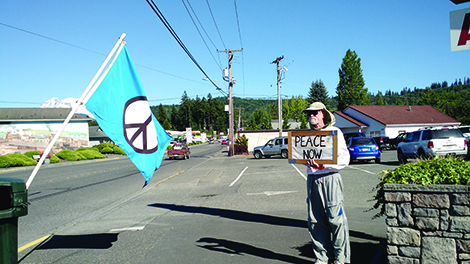During the Iraqi war of the George W. Bush presidency, a brave mother took a stand and created a movement of peaceful protest to the war by setting up a camp outside the president’s Crawford, Texas home.
Her name was Cindy Sheehan, and her son was killed in the war in Iraq. Her message spread and was heard and supported in faraway Eatonville with a candlelight vigil held on Aug. 17, 2005. More than 25 people gathered at the corner of Washington Avenue and Center Street in the rural Pierce County town with signs for peace and candles to support the troops but not the war.
Attending that vigil was Michael Hill, a dedicated peace advocate. Since then, he has become a weekly community fixture at the same corner, seen standing and holding a sign for peace every Friday from 4 to 6 p.m.
Hill, 75, who now lives in Elbe, a tiny community on the highway between Eatonville and Mount Rainier, grew up in Ohio and moved to Chicago for high school and college. That move, along with his coming of age in a time of global conflict, left an indelible mark on him and set the course for his future.
“That’s when my life changed,†he said. “I became aware of the Vietnam War in 1969 at the age of 20.â€
And that was the start of his life-long pursuit to spread awareness of nuclear weapons and promote peace. His first step was to make sure he didn’t participate in a war he didn’t believe in.
“I decided I had to go to the draft board and applied for conscientious objector status,†he said. “I was not a Quaker or a part of any of the other churches you had to be a part of to get that qualification.â€
Hill was married with a child and going to college at the time. He was deferred for a while. However, upon moving to Washington, he got drafted for the Vietnam War. “And I refused induction,†he said. “I was willing to go to jail for up to five years,†the punishment for refusing to be drafted.
But things worked out in his favor when he was sent to a psychiatrist who deemed him “unfit for service†because Hill adamantly refused to go to war.
“So that was a shock to me. I mean, I was preparing to do some time for telling him ‘I will not go to war, I will not fight, I will not kill people,’†Hill recalled.
Over the years, Hill has been more of a peace advocate than an anti-war activist. He’s been a part of the group called Ground Zero for Nonviolent Action since 1985. The group owns 3.5 acres bordering the Bangor Trident Naval Base in Kitsap County.
“That’s where we got our name,†said Hill. “’Ground Zero’ because if Kitsap were a country, it would have the third-biggest concentration of deployed nuclear weapons in the world, and should something happen here, it would wipe out Seattle and devastate the Pacific Northwest.â€
So keeping peace is in everyone’s best interest, he reasons.
“I’m not afraid of dying, but I’ve got kids and grandkids, and I want them to have a peaceful world to live in,†he said.
Ground Zero for Nonviolent Action has actively protested nuclear weapons for the past 36 years. At one point, the group had a way to track the shipment of nuclear weapons to bases via trains. “We called them ‘white trains’ because they were painted white to deflect the heat in transit,†Hill said.
Twice the protesters gathered on the train tracks to block the shipments, only stopping the trains for 20 minutes, but it was a symbolic way to show they didn’t agree with weapons of mass destruction. On the group’s second sit-in, federal agents got off the trains and arrests were made.
“We all ended up in court, but the jury found us not guilty because they understood we had a responsibility to do something about the government’s plans,†said Hlll.
Hill now spends his time volunteering at a local food bank and staying active with the Ground Zero group.
“Peace is an important objective for me,†he said, noting the street corner in Eatonville where he stands every Friday “is only 12 miles from my home. It’s easy for me to be there. I like it. I see some of the same people every Friday. I get people waving and smiling as they drive by.â€
It’s been 12 years since he started his street corner vigil, and Hill has met many people over the years – some for peace and others that think it would be great but are skeptical.
“Most people who stop to talk with me are for peace and have stories to share, but I do get some who say it can’t happen,†he said. He’s confident that if we focus on peace and practice it in our lives that it is quite possible.
“I’ve read about how a flock of flying birds change directions. It takes 15 percent to make the change, and the rest follow. Schools of fish are no different. I keep hoping that eventually those who are trying to make the world a better place will add up to that 15 percent and the rest will follow,†Hill said. “We all have a part to play. I want people to be aware of the nuclear weapons and how we should avoid a worst-case scenario to make positive changes.â€
Does he believe his protests for peace have an impact?
“There’s no way to measure that,†he answered. “If one person sees me on the corner in that two hours every Friday and goes home and has a conversation and has a shift in thinking, that’s all I can hope for. Plant the seed and hopefully what’s going on in the world will water it.â€
Tillie Vuksich, who wrote this article, is a freelance writer. She formerly lived in Eatonville and now lives in Nebraska.
